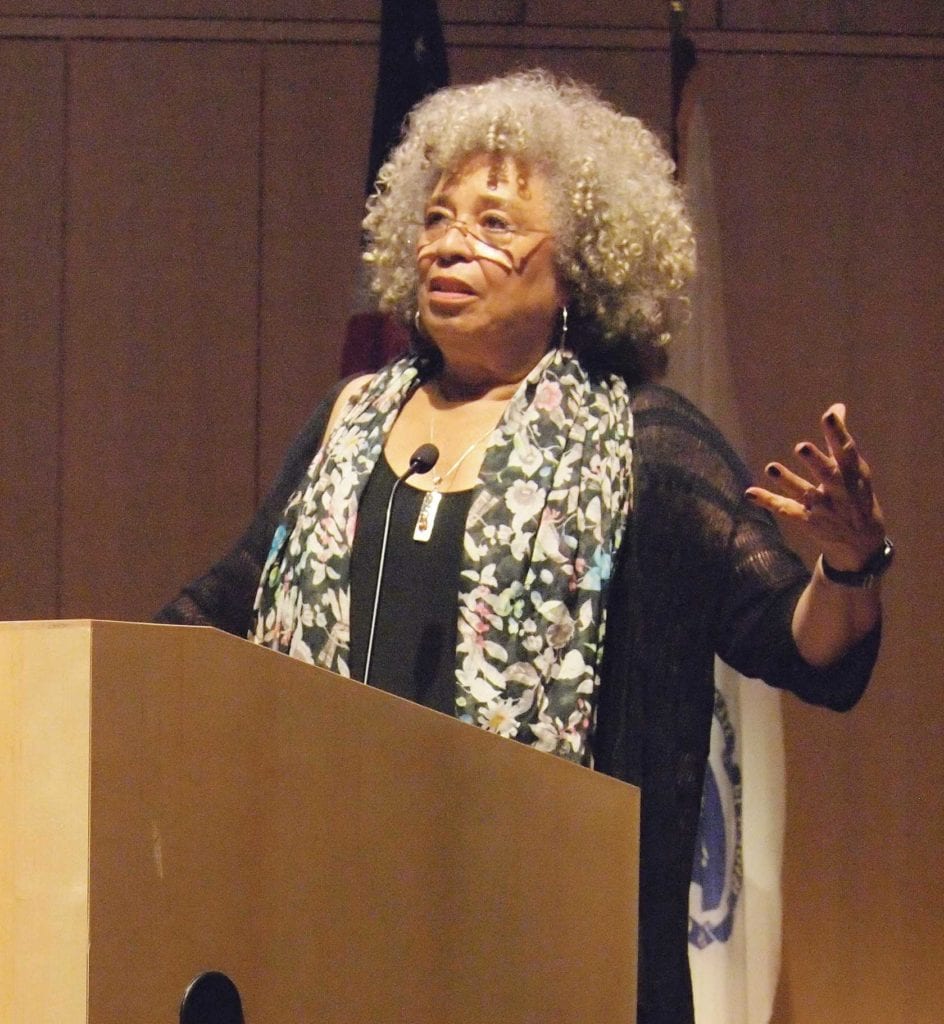Angela Davis speaks on radical feminism at BPL
Expounds on interconnections between race, feminism, equality

When Angela Davis took the stage at the Copley Library for her lecture last Wednesday, titled “Frameworks for Radical Feminism in the 21st Century,” she wasted no time in pointing out that the very way in which she had been introduced was an example of what not to do when practicing radical feminism.
The longtime activist, author and scholar spoke as part of the Boston Public Library’s Lowell Lecture series, and her introducer mentioned that the lecture series was particularly important this year, because it is the 100th anniversary of women’s suffrage. White women’s suffrage, Davis reminded us. It was only white women who got the vote in 1920, while black women could not exercise the right to vote until 1965 with the passage of the Voting Rights Act, and voter suppression continued post-Civil Rights era in many regions of the country.
“Gender equality cannot be conceptualized without foregrounding racial and economic equality,” Davis said. “Racial, economic and gender justice are inextricably connected. One is not possible without the others.” And, she said, the narrow gender binary that restricts gender identity to male or female “prevents us from understanding the fluidity and multiplicity of gender awareness, consciousness and expression.”
Davis went on to challenge the popular linear narrative of (white) feminism, pointing out that while white suffragettes learned activism from the anti-slavery movement, black suffragettes weren’t allowed to protest alongside them, and when white women got the vote, they voted no differently than white men.
“Any feminism that will help us transform the world today must be capable of including perspectives that challenge white supremacy,” Davis continued. “[as well as] heteropatriarchy, capitalism, the prison industrial complex, attacks on the environment, militarism and war.”
So how do we ensure white women don’t weaponize their vote against women and black communities, as they have since suffrage and most notably did in the last presidential election, when around 53 percent of white women voted for Trump?
“We all have to be on board this time,” Davis said. “We have to do everything in our power to guarantee that the occupant” — as Davis referred to Trump during the lecture — “is not reelected.”
Davis laid out the focus of her talk — how culture shapes social consciousness, specifically feminist consciousness, in a way that can shift social notions. She explored literature, from Ntozake Shange to bell hooks, as well as music, from Beyonce to blues.
“Let me take a sip of tea first, before I go into this,” Davis said, drinking from a mug at the podium before offering her opinion on Beyonce. “I am someone who tries never to forget about the centrality of capitalism in furthering racism and heteropatriarchy and obviously class exploitation, so I cannot overlook that Beyonce relies on and benefits from global capitalism.”
Davis also made a case for blues as a feminist music. Blues is associated with overt sexual expression, she said, and there is a strong relationship between sexuality and freedom. After emancipation, black people suddenly had power over their own sexuality, and as blues music depicted love and sexuality it revealed a desire for freedom. While many think the violence against women described in blues music is sexist, Davis noted that blues insisted on naming intimate partner violence, an acknowledgment that otherwise did not occur until the second wave of feminism when white women began naming it as well.
An interesting exchange came near the end of the event, when Davis opened the lecture up to questions. A young black man who introduced himself as one of the main organizers of the Black Men’s Collective of Boston had a question about creating space for black women at his organization’s upcoming meeting in Dudley Square’s Black Market.
“We’re wondering, do you have any advice to us, black men organizers,” he said, “on how to welcome our women into a space where we want them to be heard and validated?”
Davis took a long pause before answering his question, choosing her words carefully and kindly.
“You know, when you say welcome our women — how many reacted to that?” The auditorium erupted in laughter as the women in the room responded to Davis’ articulation of this possessive language. She asked, “Now, do you understand why there were some reactions?” The young man replied thoughtfully that he would like to know more. “You would like to know more, OK, that’s good,” Davis answered. “Because there was a kind of possessive ring that positions the men as primary, and then they’re the ones who own everything, so they own the property, and they own the women.”
Davis transitioned into a conversation about the history of women being treated as property, having addressed the young man’s question with a kind firmness that exemplified both grace and mastery of how power works across race, class, gender and sexuality.






